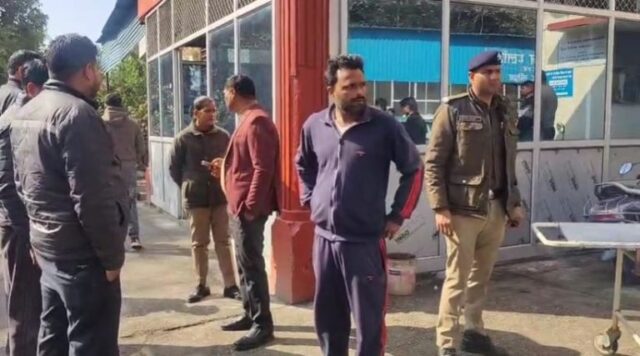Uttarakhand: Dhami created history, UCC passed by voice vote in the assembly

Uttarakhand created history today. After discussion in the Assembly, the Uniform Civil Code bill was passed today. There was discussion about the bill in the assembly throughout the day, after which the CM addressed. In the evening the UCC bill was passed by voice vote.
Chief Minister Pushkar Singh Dhami had announced the implementation of Uniform Civil Code in the state after the release of the election manifesto during the assembly elections. After BJP returned to power, he had also announced to first take a decision on the issue of Uniform Civil Code. In the very first cabinet after coming to power, the Dhami government had decided to form an expert committee for the Uniform Civil Code.
No tampering with the customs and traditions of caste, religion and sect
The Bill covers only matters related to marriage, divorce, inheritance and adoption. The provisions made on these subjects, especially the marriage process, have not tampered with the traditions and customs of caste, religion or sect. Religious beliefs will not make any difference in the marital process. Religious customs will remain the same. It is not that the marriage will not be conducted by a Pandit or a Maulvi. There will be no impact on eating habits, worship, dressing etc.
Marriage registration is mandatory
- Under the bill, it will be mandatory for every couple to register their divorce and marriage after March 26, 2010.
- Provision for registration at Gram Panchayat, Nagar Panchayat, Municipality, Municipal Corporation, Metropolitan Municipality level.
- Provision for maximum penalty of Rs 25,000 for non-registration.
- Those who do not register will also be deprived of the benefits of government facilities.
- The minimum age for marriage has been fixed at 21 years for a boy and 18 years for a girl.
- Women can also use the same reasons and rights as men as the basis for divorce.
- Practices like Halala and Iddat have been abolished. There will be a ban on any kind of conditions for the woman to remarry.
- If someone changes religion without consent, then the other person will have the right to divorce that person and take maintenance allowance.
- Remarriage will be completely prohibited when a husband and wife are alive.
- In case of divorce or domestic dispute between husband and wife, the custody of the child up to five years of age will remain with his mother.
Equal rights in property
- Son and daughter will have equal rights in property.
- There will be no difference between legitimate and illegitimate children.
- Illegitimate children will also be considered biological children of that couple.
- Adopted children born through assisted reproductive technology through surrogacy will be biological children.
- The property rights of the child growing in the womb of a woman will be protected.
- A person can give his property to any person by will.
Registration of live in relationship is mandatory
- Registration on the web portal will be mandatory for every person living in a live-in house.
- Couples will be able to take a house, hostel or PG on rent only with the registration receipt.
- Children born in live-in will be considered legitimate children and will get all the rights of biological children.
- For those living in a live-in relationship, it will be mandatory to register for separation.
- If mandatory registration is not done, there will be a provision of six months imprisonment or a fine of Rs 25,000 or both.
No law for adoption
No law has been made for adoption in the Uniform Civil Code.
UCC landed on the ground after many decades
- In 1962, Jan Sangh talked about withdrawal of Hindu Marriage Act and Hindu Succession Bill. Jana Sangh then advocated for a uniform law for succession and adoption in 1967. The promise was repeated in 1971 also. However, there was no discussion on this issue in 1977 and 1980.
- BJP was formed in 1980. Atal Bihari Vajpayee became the first national president of BJP. The party contested elections for the first time in 1984, winning only two seats.
- 9th Lok Sabha elections were held in 1989, in which BJP included Ram Mandir, Uniform Civil Code in its election manifesto. The number of seats of the party increased to 85.
- In 1991, the 10th mid-term elections were held in the country. This time BJP got more benefits. Its number of seats increased to beyond 100. In these Lok Sabha elections, BJP strongly raised the issues of Uniform Civil Code, Ram Temple, Section 370. All these issues were included in the election manifesto of BJP, but due to numerical strength they could not be completed.
- After this, in 1996, BJP formed the government for 13 days. In 1998, the party ran the government for 13 months. In 1999, BJP along with its allies formed the government with majority. Then Atal Bihari Vajpayee became the Prime Minister.
- For the first time in the year 2014, BJP came to power with a huge majority and Modi government came to power at the centre. Modi government started working on its election promises with full vigor. Now the Central Government is working towards implementing the Uniform Civil Code. In this context, Uttarakhand is moving towards becoming the first state in the country to implement UCC.
- In Uttarakhand, in 2022, BJP had kept the issue of UCC paramount and had promised that work would be done on it as soon as the government is formed. Dhami government formed a committee for UCC. Who prepared the draft of UCC in one and a half years.






